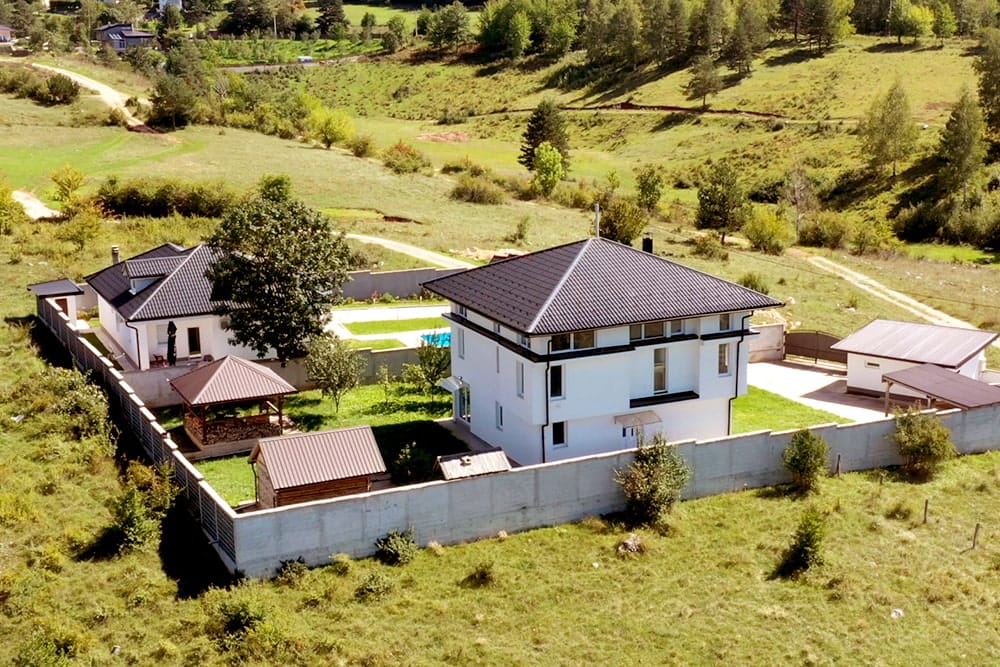The Sarajevo Municipal Court found that the powers of attorney and the sales contract based on which the suspended head of the FBiH Uniformed Police Sector Zoran Čegar registered as the owner of the estate near Sarajevo are null and void. Consequently, the registration of title over the 557-square meter plot at the Barice area has no legal bearing, explained the first-instance verdict.
Čegar can appeal this decision, but if upheld by the second instance court, the land will be returned to its previous owners, Zlatan and Dijana Radovanović.
Dijana Radovanović filed a lawsuit claiming that the property was sold without her knowledge, hence the power of attorney her husband gave to Čegar, and the subsequent sales contract cannot be considered legal. The court confirmed this position, explaining that Dijana’s consent should have been obtained, even though she was not registered in the land register.
However, the court process also revealed other details about how this police officer got hold of this property.
Namely, with the consent of Radovanović, his friend Kenan Krasnić built a house on the plot in question. Radovanović and Krasnić agreed to legalize the house and to sell it, and then divide the profits proportional to their stakes.
The buyer was Čegar, who agreed with Krasnić to buy the property for half a million BAM, but since he had no money, he offered him another property in return.
“I had 15 dunums of land in front of his house on Obhodža, on Dariva (part of Sarajevo, author’s note). I had 15 dunums of land. He asked me for it and he got it, of course. He asked me for a 110 sqm office space in Vlašić and he got it. He got a G-class Mercedes, an E-class Mercedes, and a boat with a trailer,” Čegar said in court, claiming that Krasnić subsequently asked for more. “He asked for the Toyota I drove and a snowmobile.”
Krasnić replied that the above-mentioned pieces of property were problematic: “Zoran Čegar gave me five pieces of property none of which had [title] papers, hence I could never deed them. The only thing I’ve got from Zoran Čegar that I managed to deed in my name was a G-class Mercedes”.
Unlike him, Radovanović claimed to have not received anything from Čegar in exchange for the property in Barice, yet in early 2018 he gave him a power of attorney attested by notary Dževad Pazalja.
Radovanović claimed the power of attorney was supposed to be used to transfer the electricity connection, and believing that the document is allowing only that, he has not read the details thereof.
But, as it turned out, Pazalja attested the power of attorney that began with authorizing Čegar to legalize the building and connect it to the utility infrastructure“, but in the second part of the document it authorized him to sell real estate and transfer the rights issuing from the power of attorney to a third party.
Twenty days later, Čegar returned to the notary and transferred the power of attorney to his friend Selma Filipović, a professor at the Faculty of Veterinary Medicine in Sarajevo, thus authorizing her to sell the property. They immediately signed a sales contract under which Filipović, acting in the name of Radovanović, sold “the land with a house under construction” to Čegar for 50 thousand BAM. Based on this contract Čegar registered as the new owner of the property.
Filipović said in court that she ran into Čegar at the notary’s by chance and that everything was done in a hurry. She claimed she did not know the Radovanović couple nor did she take any money, while Čegar claimed he never read the documents he was signing.
“I’m not a lawyer, I’m a copper, a gendarme (…) I don’t read, I just sign”
In the reasoning of the verdict, the court said that, although aware of the fact that Power of Attorney had another purpose, the notary Pazalja failed to “check the real will of the parties” and examine if Radovanović was even authorized to give the power of attorney.
Selma Filipović and Dževad Pazalja – who in the meantime lost his work permit due to professional misconduct – did not want to comment on the court’s decision.
Last year, CIN wrote about how Čegar has been acquiring property over the past 20 years. As in this case, he often resold or traded without money, bartering his property for other people’s real estate and vehicles.
His partners colloquially call it “trange-frange” affairs, the logrolling.
CIN reporters then discovered that the document based on which he registered as the owner of the property in Nišići was forged and that he was being criminally prosecuted for fraud in Dubrovnik.
As soon as the FBiH Police Administration found out about it, he was suspended from duty. In the meantime, the Court in Dubrovnik sentenced Čegar for threatening a CIN reporter to seven months in prison on the condition that he does not commit a new criminal offense within two years of the verdict becoming final.







